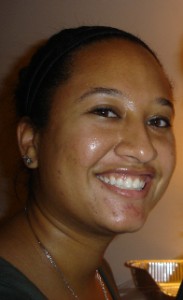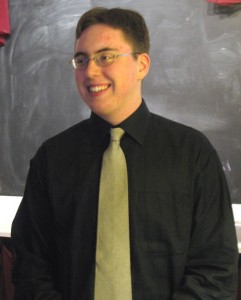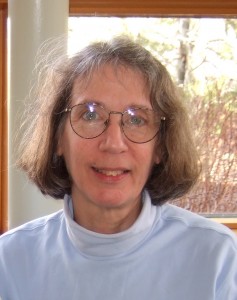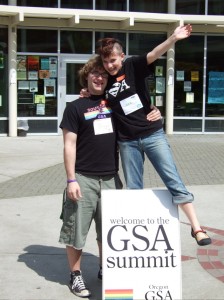We have such an interesting and diverse membership, spanning six Smith generations, that we want you to get to know some of them. Contact us to give us your recommendations for other members to feature in the future.
Jenn Barone ’08
 As a recent graduate, I often find myself reminiscing about my undergraduate experience but mostly I miss the people who make Smith the unique and extraordinary place that it is. The level of dialogue, the space to roam free as bird- to be whoever you wanted to be, is something I now cherish as I’ve entered the “real world.” I have always found that my social identities may interact with one another, but for the most part, my race and ethnicity trump my sexuality. Prior to my time at Smith, this was the case because I never took the time to reflect on the intersectionality of being a woman of color and queer. Along with exploring my identities, Smith cultivated my love of the sciences, and particularly my desire to eventually work with minority women populations. My psychology advisor, who was extremely important in exposing me to public health, was a blessing in every way a person could be and was one of the few who truly challenged me to think beyond the classroom.
As a recent graduate, I often find myself reminiscing about my undergraduate experience but mostly I miss the people who make Smith the unique and extraordinary place that it is. The level of dialogue, the space to roam free as bird- to be whoever you wanted to be, is something I now cherish as I’ve entered the “real world.” I have always found that my social identities may interact with one another, but for the most part, my race and ethnicity trump my sexuality. Prior to my time at Smith, this was the case because I never took the time to reflect on the intersectionality of being a woman of color and queer. Along with exploring my identities, Smith cultivated my love of the sciences, and particularly my desire to eventually work with minority women populations. My psychology advisor, who was extremely important in exposing me to public health, was a blessing in every way a person could be and was one of the few who truly challenged me to think beyond the classroom.
I entered Smith as a young woman thinking I knew everything, and in particular, I thought I knew my social identities inside out. I was mistaken! I began my first year, hitting the ground running, by getting involved with organizations that cultivated my identities, myself. The Bridge pre-orientation program allowed me for the first time to connect with students of color who understood my experiences and led me to the Black Student Alliance (BSA) organization. It was here that I was able to connect with my ethnic identity as a biracial black woman, an experience that was unchartered territory for me coming from a mostly-white educational experience. Along with the BSA, Prism, an organization for queer students of color, provided the perfect outlet for me to explore how race and ethnicity coincide with sexuality. Throughout my Smith career I was involved in Prism, acting as the secretary, co-chair, and eventually chair. My experiences, good and bad, taught me life lessons about myself, the queer community, and how there is still much work to be done in fully accepting people of color as queer folks (within queer circles and within specific communities of color). This became one of the reasons I joined this affinity group.
My other experiences at Smith contributed to my development as a “Smithie,” however I wouldn’t say they held as much weight as the aforementioned. My position as the class secretary for the senior class of 2008 (a role I am currently holding as an alum) and being a member of the amazing Residential Life team as HCA and then HR of Wilson House where both important to my Smith experience because they taught me life skills that I use everyday in work and as a graduate student.
In a nutshell, this was my life at Smith and all of these experiences led to my life now. Currently, I’m a graduate student at The George Washington University where I am pursing my Master’s in Public Health. My concentration is Maternal and Child Health, which I am just starting to explore and I love it! I hope to eventually work with minority women in some fashion or another. I chose to go into public health largely because of two things- my Smith advisor and the classes I took that she offered, and my desire to go into public service (particularly with the state of things nowadays). I wanted to serve a community I thought was in need (in my case, women) and public health allowed me to combine that interest with my love for medicine and health related topics.
Tobias Davis ’03
 Toby Davis is a prize-winning playwright whose play, Standards of Care, has been chosen by Minnesota’s GLBT Magazine, Lavender, as one of the top 10 productions of that area’s regional theater season. (It was produced in June at Patrick’s Cabaret.) Toby’s play, said Lavender, “is arguably the best play yet written about female-to-male (FTM) transgender life.”
Toby Davis is a prize-winning playwright whose play, Standards of Care, has been chosen by Minnesota’s GLBT Magazine, Lavender, as one of the top 10 productions of that area’s regional theater season. (It was produced in June at Patrick’s Cabaret.) Toby’s play, said Lavender, “is arguably the best play yet written about female-to-male (FTM) transgender life.”
Toby works at the Smith School for Social Work as Coordinator of Continuing Education and a systems specialist. He lives in Northampton with his partner, cmoore ’02. The following is excerpted from an interview with Toby in the Fall 2008 issue of the Smith Alumnae Quarterly Online.
My dream as an undergrad was to be a playwright. But I thought it would have to be a hobby and I’d have to do “real” work. Smith really changed that for me… I took a playwriting course with Leonard Berkman in the theatre department that really cemented my interest in playwriting. I had written a play in high school that I was pretty excited about and I wanted to try more. He was enthusiastic, with a knack for criticism–not cutting you down, but coming from a really nurturing place…
I wrote a number of plays, including a one-act that I acted in, called Crossing, that explored the notion of Jesus as a trans-man or a female-to-male. I played Jesus, which was pretty intense and led me to explore the conflict between myself as an actor and a writer. My senior year, I wrote Naked I: Monologues From Beyond the Binary, which won the Five College Denis Johnston Prize, which was very exciting…
Smith shook up my concept of the world. Before, I didn’t look at how my upbringing and circumstances had shaped my views. I guess I assumed everybody sort of saw the world in some generic way. At Smith, I began to think about systems of oppression and privilege and how that shapes your experience. I thought about what I have and what I don’t have, and where I come from. What does it mean for me to be a racially privileged white man, yet marginalized because I live as a trans-man? I never took being at Smith for granted. I remember looking around the dining hall or classroom, and thinking, This, right now, is precious. My only job is to be here and to learn. I had great conversations, supportive experiences. These things made me who I am today.
Joyce Liljeholm ’68
 Joyce is a straight ally who came to Smith from Montclair, NJ. Living in Talbot House, she majored in biology, loved Mountain Day, and sang in the Smith College Choir. Joyce was part of protests for racial justice and against the Vietnam War, but was ignorant of LGBT issues. She now wonders if Pam Brandt of the Deadly Nightshade was her classmate at Montclair HS (1964).
Joyce is a straight ally who came to Smith from Montclair, NJ. Living in Talbot House, she majored in biology, loved Mountain Day, and sang in the Smith College Choir. Joyce was part of protests for racial justice and against the Vietnam War, but was ignorant of LGBT issues. She now wonders if Pam Brandt of the Deadly Nightshade was her classmate at Montclair HS (1964).
In Portland, Oregon, Joyce earned further degrees from Reed College and Lewis and Clark College, to become a HS teacher and then a counselor. In 1990, her students began seeking her help, when they encountered parent hostility to their gay or lesbian identity. Joyce turned to PFLAG for information and resources and has been involved ever since. In 2000, Oregon suffered an anti-gay ballot initiative, and Joyce, newly retired, put in countless hours helping defeat the measure. That effort led to co-founding the Oregon Safe Schools and Communities Coalition. In 2001, an annual Safe Schools Training began, for youth-adult teams to plan improvement of their local school climate. In 2005, OSSCC founded the Oregon GSA Network, and the first GSA Summit followed in 2006.
 Joyce is active in the United Church of Christ, chairing the regional committee on LGBT issues. This group has brought educational workshops to churches in the Idaho, Oregon and SW Washington region, leading well over half of the congregations to declare themselves intentionally welcoming. This was initially an effort addressing gay and lesbian issues, but now includes strong bisexuality and transgender components. Joyce is associated with the Oregon Coalition Against Hate Crimes, PFLAG Portland, Oregon’s Healthy Kids Learn Better Coalition, the Oregon School Based Heath Care Network Advisory Council, Oregon School Counselors Association and the National Association of GSA Networks.
Joyce is active in the United Church of Christ, chairing the regional committee on LGBT issues. This group has brought educational workshops to churches in the Idaho, Oregon and SW Washington region, leading well over half of the congregations to declare themselves intentionally welcoming. This was initially an effort addressing gay and lesbian issues, but now includes strong bisexuality and transgender components. Joyce is associated with the Oregon Coalition Against Hate Crimes, PFLAG Portland, Oregon’s Healthy Kids Learn Better Coalition, the Oregon School Based Heath Care Network Advisory Council, Oregon School Counselors Association and the National Association of GSA Networks.
Finally, Joyce is proud that her family has adopted her values. Her husband joins her at Pride events, and one adult son and his fiancée introduced their young Unitarian Universalist Church to the Portland Pride parade. The other son gives countless hours of data entry to Basic Rights Oregon (Oregon’s LGBT equality organization).
